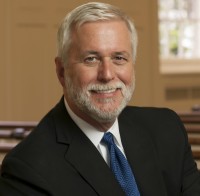
After witnessing the devastation of society following World War I, W. B. Yeats lamented that “things fall apart; the center cannot hold.” It’s a famous line of poetry that social commentators invoke a lot these days.
But the world was always falling apart, as even the most cursory reading of history reveals. Sometimes a society’s demise came at the hands of an invading empire that wiped out government, commerce, worship, and culture. At other times, a deadly plague destroyed the known world. Or a devastating economic depression stripped people of their farms, jobs, and hopes for a future. Over the last few generations we learned to live with nuclear threats and terrorism. If we’re paying attention, we have to realize that the world as we know it is always a thread away from unraveling.
Even when we succeed in ignoring these global realities, we’re forced daily to defend ourselves against the demise of our personal worlds. We’re surrounded by marriages that crumble, companies that downsize, and diseases that rob us of loved ones. So we spend the precious few discretionary dollars and hours we have going to the gym, shopping at Whole Foods, seeing a therapist, or trying to be a monk for a day at a monastery—all in the hopes of keeping our little world together. Yet despite our best efforts to be healthy, things still fall apart.
Read our latest issue or browse back issues.
The natural response to our anxiety is to huddle together with others who share our particular worries and to agree to blame someone else. They are not like us. They are trying to take something away from us. We have to stop them. Sometimes “they” are gay couples. Sometimes “they” are straight Republicans. Or the liberal elite, or Muslims, or the police, or undocumented immigrants. Or, or, or. There is no limit of people to blame for dismantling our cherished understanding of how the world should be.
This blaming may well be just. As the neo-Nazis at Charlottesville reminded us, there really is a “they” made up of racist fascists with a mission to rid their world of those who do not look like them. The hurt they create is sheer evil.
The problem is that even when we know who threatens us, labeling them as dangerous does not make us more secure. What we need is someone who can intervene in the world, destroying the power of evil. We need a Savior.
Colossians 1 is relentless in its claim that all things hold together in Jesus Christ. The phrase “all things” is used five times in six verses, underlining the point: nothing is left out of the realm of redemption. Christ is the center of all things, and this includes both us and them. It includes those who don’t know they are included and even those who don’t want to be included.
At a time when society is again falling apart into combative factions of us and them, let at least the church believe that all things are centered in a Savior. And that this center will hold.
When we are clear about the center, we don’t have to worry about the boundaries that delineate us from them. This doesn’t mean that there isn’t an us and a them. It does mean that it’s painfully clear that the need for salvation is all that holds us together.
Clear—but difficult. Our seminary campus aspires to racial, gender, economic, and theological diversity that is centered only in Christ. But I am often involved in conversations about how difference leads to mistrust and hurt. The only way we can navigate through difference is by coming back to our common center in a Savior who holds us together. It is also this core conviction that best motivates the church to action. We work for social justice not because we believe our best efforts will be effective but because we throw our lives into the redemptive work of a Savior who is not nearly done pulling together the things that have fallen apart.
Jesus Christ called his disciples to be his witnesses to the ends of the earth. Witnesses don’t make things happen; they testify to what they see. To be a witness of Christ is to see more than the devastation that troubled Yeats. It means throwing ourselves into slow-coming salvation. So the church sends its members to homeless shelters, to tutoring programs, and to public protests against efforts to preserve a society of white privilege. But we do all this because our witness is centered in a belief that an ascended Savior is still at work in the world.
Those of different religions or no religion may effectively work for a better society for their own reasons. The church is happy to stand beside them in this common pursuit of the common good. But let us be clear that we know why we are showing up at the places of injustice. It is only because we believe Christ got there before we did.
This conviction preserves the church from both despair and triumphalism. We cannot lose hope, because we’re witnesses to a Savior who is still at work. As the last 2,000 years have made abundantly clear, the church is not that savior. But we gather in houses of worship every Sunday to center our lives in the great faithfulness of a God who has come down to us, and to all things.
A version of this article appears in the October 11 print edition under the title “The center that can hold.”







